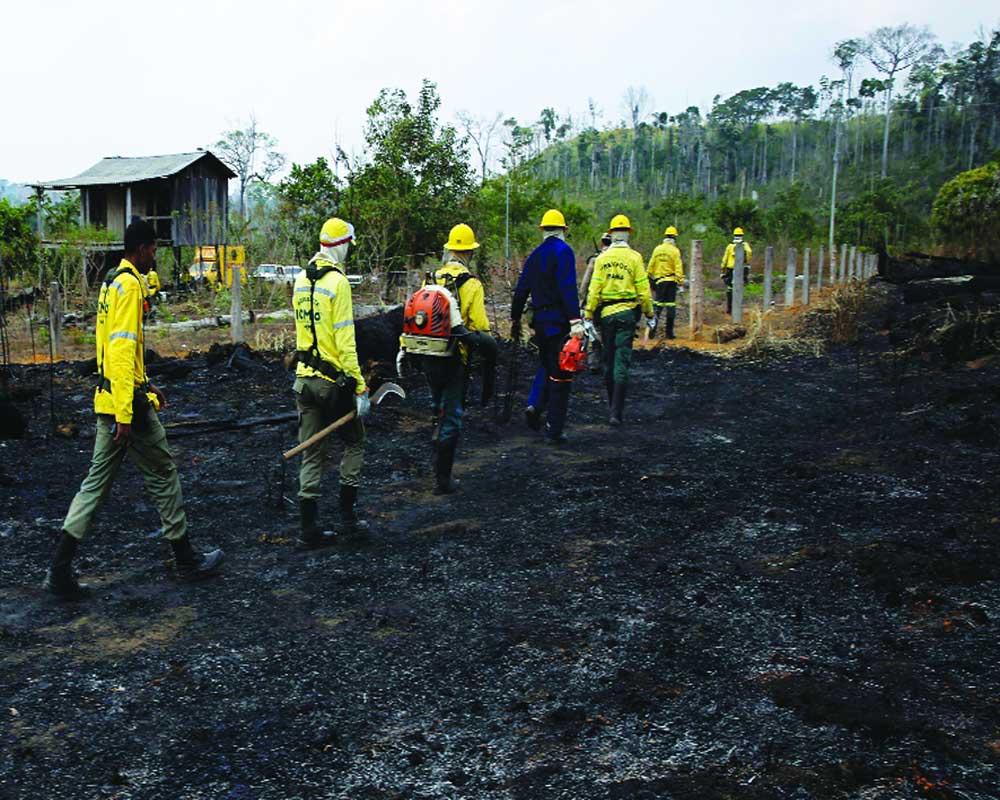The combined impact of human intervention, frequent forest blazes and climate change is beginning to tell on the health of the Amazon rainforests, the much-needed carbon sink of the world
Considered a formidable natural fortress, the Amazon rainforests have a legendary reputation due to their density, which reaches almost mythical levels. But the spectre of climate change seems to be catching up with these awe-inspiring ecological assets as well. This year has been particularly punishing, as Brazil’s National Institute for Space Research (NISR) detected 72,000 fires between January and August 2019 and around 9,500 conflagrations since last Thursday alone.
According to the space agency and satellite data, wildfires in the Amazon rainforest rose by 84 per cent this year. The world’s largest, these rainforests play the role of a carbon sink and slow down the rate of global warming. Apart from this, they are home to millions of animal species and indigenous populations. Anthropogenic intervention had been nibbling away at these forests for long but till now this ecological marvel had been successful in keeping its adverse impact at bay. Sadly, now the combined impact of human intervention coupled with climate change is beginning to tell on the health of these rainforests.
The intensity and the consequent damage caused by these blazes can be gauged by the fact that the smoke emanating from these infernos caused an hour-long blackout in Sao Paulo, a city 2,700 km away. While the dry season provides favourable conditions for wildfires in Brazil, fires meant to clear the land for cattle ranching also cause them. Amazonas, a state in northwestern Brazil, declared an emergency in the wake of the conflagrations, while satellite images showed Roraima engulfed in choking black smoke.
According to data published by NISR, the country saw 88 per cent increase in deforestation in June 2019, a figure that was instantly dismissed by Brazilian President Jair Bolsonaro, who attributed it to farmers setting fires to clear land.
However, conservationists blame Bolsonaro for encouraging loggers and farmers to clear the land, resulting in rampant forest fires and deforestation. In fact, scientists believe the loss of forests in Amazon is taking place at a faster rate since the new President took office in January 2019.
Given the important role these natural carbon sinks play in fighting global warming, the Amazon conflagrations have attracted world attention. On August 23, 2019, the United Nations chief, Antonio Guterres, also expressed deep concern over the fires and called for the protection of these rainforests.
Yet another cause for the spike in wildfires is the rapid rise in ambient temperatures. In India, too, rising temperatures play havoc with our green cover. As many states witnessed higher than normal maximum temperature this week, instances of large blazes increased more than six times across the country.
According to the India Metrological Department (IMD) data, the average maximum temperatures have been on the rise at most places in Uttarakhand, Nagaland, Manipur, Mizoram, Tripura, Punjab, Haryana, Chandigarh, Delhi, east Uttar Pradesh, Jharkhand, Jammu & Kashmir, Bihar, Chhattisgarh, Marathwada and coastal Andhra Pradesh. The Forest Survey of India’s (FSI’s) data shows that on an average, there are more than 100 large, active forest fires in the country. The highest number of blazes is being reported from Uttarakhand, Chhattisgarh, Madhya Pradesh and Uttar Pradesh.
Another reason that literally adds fuel to forest fires is the scanty rainfall. These conditions are further exacerbated in areas such as the Amazon where the loss of green cover is immediately apparent. In fact, studies show that nearly 2.2 million square miles of the Amazon rainforest are nearing a tipping point, and large, fragmented portions of the rainforest could degrade into an entirely different, drier ecosystem. This would lead to the acceleration of climate change, the loss of countless species and disaster for the indigenous populations that call the tropical rainforest home.
Be it forests in India or in the Amazon, they all have a crucial role to play in containing climate change and absorbing atmospheric carbon. Sadly, these precious carbon sinks are falling prey to human greed.
In the case of the Amazon, the biggest threat that is emerging is the presence of economic interest groups, which are eating away at the Amazon rainforests such as cattle grazers and soyabean growers. These human groups are slowly wreaking havoc and this is precisely what the countries across the world must fight to stop. The impact of climate change is becoming apparent in all walks of life and now the global forest covers, too, are not exempt. There need to be concerted global efforts to ensure that natural assets are insulated against degrading developments. The state of the Amazon rainforests due to the fires is nothing short of unfortunate and needs immediate intervention and redressal.
(The writer is an environmental journalist)


























